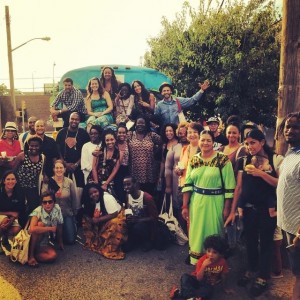Download the Green the Church Summit Flier
Thank you to our Green the Church Summit sponsors:
Want to learn more about Green The Church?
Our Green the Church (GTC) campaign was created to build resilient communities that are not only prepared for the effects of climate change, but also able to mitigate its impacts through the adoption of a sustainable energy infrastructure, such as solar and energy efficiency.
Developed in partnership with Green For All Fellow Rev. Dr. Ambrose Carroll, Green the Church will work to empower church leadership and laypeople to develop practical solutions to economic and environmental issues in the Black community. This initiative will launch in partnership with Black churches nationwide, and will act as a testing ground for how anchor institutions in low-income communities and communities of color (religious and otherwise) can be centers for community resilience. Rev. Dr. Carroll, a well-known and respected pastor in Berkeley and GTC’s constituent organizer for Places of Worship, has been working to engage over twenty-five denominations.
Green The Church has four components:
Green The Building
- A nationwide effort aimed at helping churches mitigate the impacts of climate change by building a sustainable energy infrastructure. The program will help churches access energy efficiency audits and solar panel installations by assisting with the navigation of financing and capital development.
- GFA will work in partnership with the State Energy Research and Development Authority and Mosaic (a solar company) in New York, the National Religious Partnership for the Environment in the Southeast, and local energy companies in the San Francisco Bay Area.
- Rev. Dr. Carroll, along with Julian Mocine McQueen, GFA’s Director for Education and Outreach, will utilize Green For All’s strong movement-based approach and online presence to encourage local church communities to go beyond solar panel installation by supporting pilot storm water collection and recycling programs.
- This program will have a strong educational component: Congregants will begin to understand more complex topics of carbon emissions through an initial engagement with a church solar installation. We will support these newly engaged congregants to become more involved in advocacy, thus supporting the bridge between “the people” and “experts.”
- These efforts not only show a commitment to ecological justice but also will assist many struggling congregations in reducing their financial burdens with an affordable renewable energy infrastructure.
Develop Creation Stewardship
- We will work with leading theologians and seminaries to develop culturally relevant theological resources for environmental teachings that will explain the church’s moral obligation to have a part in the work of environmental justice in the world.
- Partnerships will include, but are not exclusive to, the Vanderbilt Seminary, Union Theological Seminary, and the American Seminary of the West.
- Educational tools will include sermon outlines, theologically relevant resources, toolkits on developing green committees, and easy to implement green tips for churches and it’s congregants to consider.
Establish Centers for Resilience
- Churches have long served as refuges for congregants to when their homes, lives, or livelihoods are at risk. We will work with church leaders from around the country to better understand the role of the church as a hub and shelter from disaster.
- We will identify churches in communities of greatest risk of the immediate impacts of climate change and have them designated as Disaster Relief Centers.
- We will work with leaders and churches to develop best practices, identify shared services, energy alternatives, and case management structure to assist with housing, food, and communication needs.
Foster Thought Leadership
- Identify key church leaders from across the country who are able to speak to the importance of “creation stewardship” and community resilience.
- Convene these leaders each year to share best practices, theological understandings and learnings that can be shared broadly.
- Train a group of faith leaders who can speak on behalf of our folks at conferences, with decision makers, and in the media about the work it will take to truly develop sustainable resiliency.



